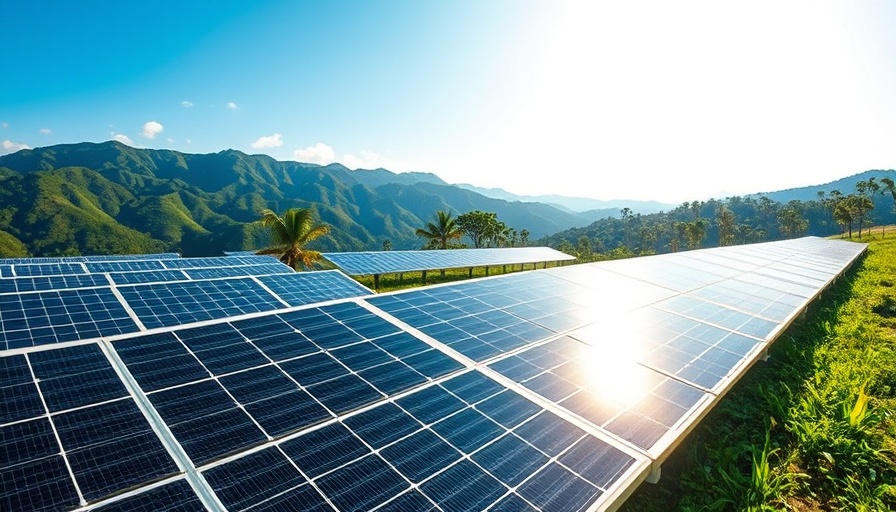
China’s Emergence in Indonesia’s Energy Landscape
In an intriguing twist in the energy financing narrative, China has rapidly ascended as a dominant force in Indonesia's renewable energy shift, particularly following complications afflicting Western financial commitments. With the West politically withdrawing support, reflected in the United States' recent exit from the Just Energy Transition Partnership (JETP), China has capitalized on this vacuum, positioning itself as the primary investor in the green energy sector.
A Shift in Investment Dynamics
The establishment of JETP aimed to transition Indonesia’s economy from its reliance on coal, promising $20 billion in funding. However, less than $1.2 billion has been mobilized so far, highlighting a significant gap between commitment and execution. This slowdown left Indonesia searching for partners, and thus, China swiftly stepped in to offer comprehensive solutions across its renewable energy spectrum, from solar power to electric vehicle (EV) production. The Chinese presence is increasingly visible, with substantial funding and swift project timelines, contrasting sharply with the slow operational pace associated with Western financial models.
Increased Chinese Financial Commitments
According to a report by the Lowy Institute, China's development financing in Southeast Asia increased sharply, reaching nearly $5 billion in Indonesia alone. This swift escalation in support for infrastructure projects, including solar, hydropower, and EV facilities, has marked a significant shift in energy investment dynamics. Chinese firms, such as State Grid Corporation of China and Trina Solar, have already inked agreements totaling $54 billion with Indonesia's state-owned power company PLN. As China solidifies its foothold, the risks associated with a lack of rigorous environmental oversight have also surfaced, prompting calls for more stringent governance in energy projects.
Risks and Environmental Safeguards
While the rapid influx of Chinese capital presents opportunities for Indonesia in diversifying its energy mix, it raises critical questions about environmental governance. Experts such as Putra Adhiguna of the Energy Shift Institute urge for improved standards in overseas investments. The challenge lies in striking a balance between harnessing swift progress and ensuring robust environmental safeguards to prevent potential pitfalls associated with rapid industrial expansion, especially in sectors culturally sensitive to environmental impacts.
Future Implications for Indonesian Energy
Looking ahead, China's expanding influence in Indonesia’s energy landscape may offer several significant benefits, such as the ability to drive sustainable practices. A move towards renewable energy investments aligns with global sustainability goals, highlighting business opportunities around green technology and eco-friendly products. For environmentally-conscious readers, this evolution presents a dual narrative of opportunity and caution—where the progress towards clean energy must be matched with environmental responsibility.
Global Context and Local Responses
This emerging dynamic isn’t occurring in isolation; it reflects broader trends in international investment regarding climate change. As countries grapple with their commitments to sustainability amidst political and economic pressures, Indonesia's landscape serves as a microcosm of these larger global challenges and opportunities. Drawing insights about the implications of foreign investments will be crucial for community stakeholders and policymakers as they navigate this shifting terrain.
Engaging with Green Practices
As Indonesia forges ahead with its energy transition, the importance of sustainable living practices emerges clearer than ever. The community can take inspiration from China's investments and enhance their involvement in supporting renewable energy initiatives while advocating for responsible practices—promoting a circular economy, reducing waste, and adopting greener technologies in daily life. For individuals passionate about sustainability, taking action locally by adopting eco-friendly products or supporting sustainable development initiatives can amplify these efforts.
In conclusion, as international partnerships evolve, it’s crucial for stakeholders to stay informed and engaged. Understanding the shifts in investment dynamics, and advocating for sound environmental practices will be vital in ensuring that while we transition towards clean energy, we do so with respect for the environment.
Take action today by exploring ways you can support sustainable living and contribute to Indonesia’s energy transition in responsible and impactful ways. Whether it’s choosing sustainable products or advocating for more rigorous environmental policies, your involvement matters.
 Add Row
Add Row  Add
Add 



Write A Comment